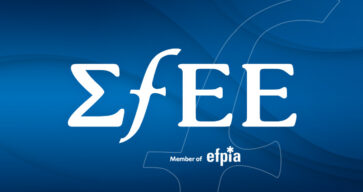European Immunization Week
Press Release
European Immunization Week: 24-30 April 2019
Vaccination is an investment in human health
Athens, 18.04.2019 – Every year, the World Health Organisation European Region marks the European Vaccination Week to promote immunization as vital to preventing diseases and protecting life. This year, the campaign runs during the week 24-30 April 2019 and celebrates the “vaccine heroes”, i.e. entities and individuals that contribute to vaccine research and development, information and public awareness and the broad implementation of vaccination programmes. On the occasion of the European Vaccination Week, SFEE recalls the important role that vaccination has played in eliminating life-threatening diseases (diphtheria, poliomyelitis) and expresses its concern about the large number of deaths that are still caused today by vaccine-preventable diseases.
According to the World Health Organisation (WHO), every year worldwide 2-3 million deaths are prevented through vaccination, while 750,000 children are saved from disability. It is also estimated that 1.5 million deaths worldwide can be avoided through increased vaccination coverage. In our country, since last October 364 people have been admitted to ICU for laboratory-confirmed influenza, of whom only 15% were previously vaccinated, and 130 deaths from influenza have been recorded. Also, more than 3,000 cases of measles have occurred since 2017. Equally worrying is the number of tuberculosis cases, at 580 annually.
SFEE President Mr. Olympios Papadimitriou stated: “Vaccination is an investment in human life and contributes to the sustainability of the national health system by reducing the incidence of contagious diseases and viral infections. Everyone’s actions should not be limited to the European vaccination week only, but rather the week should mark a starting point for designing a long-term prevention policy “.
In this direction, SFEE has, for the first time, drawn up a position document entitled “The importance of prevention through vaccination”, in order to communicate the need for:
- cooperation and co-ordination among all stakeholders to increase vaccination coverage;
- setting Vaccination Targets; and
- establishing a vaccination recording and monitoring system.
The document (in English) is available on the SFEE website: https://www.sfee.gr/documents/2019/04/sfee-position-on-vaccination.pdf
Year after year, SFEE member companies make every effort to deliver vaccines in a timely manner and in sufficient quantities to meet the health needs of the population. However, the cost of this effort is fully covered by the companies themselves, through excessive claw-back as a result of cuts in public pharmaceutical expenditure. Integrating vaccination costs into prevention expenditure, as is the case in other European countries, would highlight the importance of vaccines for the protection of public health and would support the multi-sided effort to increase vaccination coverage, with long-term gains to the health system and the health of the population. At the same time, it would also ensure the sustainable funding of prevention, which, as stated in the Recommendation of the EU Council of Health Ministers, is a goal to be pursued by every Member State.
SFEE President Mr. Olympios Papadimitriou noted: “Vaccination is an act of responsibility. Vaccines prevent, they do not cure; they should therefore be included in a separate prevention budget. It is worth mentioning that the cost of vaccines in our country is estimated at EUR 118 million annually, which corresponds to just 1.3% of public funding for health expenditure”.
WHO Europe, http://www.euro.who.int/en/media-centre/events/events/2019/04/european-immunization-week-2019, Accessed 17 April 2019.
WHO. http://apps.who.int/iris/bitstream/10665/63043/1/WHO_GPV_ PR_96.01.pdf , Accessed 17 April 2019.
National Organisation for Public Health, Weekly Epidemiological Surveillance Report on Influenza, 4 Αpril 2019.
National Organisation for Public Health, https://keelpno.gr/disease/ilara/ Accessed 17 April 2019.
National Organisation for Public Health, https://keelpno.gr/24i-martioy-pagkosmia-imera-fymatiosis/, Accessed 17 April 2019.
Vaccination costs are part of the EOPYY’s outpatient healthcare budget. In recent years, this budget has been limited to EUR 1.945 billion, with pharmaceutical companies required to pay back the overruns through the claw-back mechanism, as the total expenditure for pharmaceutical care is much higher than this level.
https://eur-lex.europa.eu/legal-content/EN/TXT/PDF/?uri=CELEX:32018H1228(01)&from=GA
ELSTAT, Press release: “System of Health Accounts, year 2017”, March 2019.



